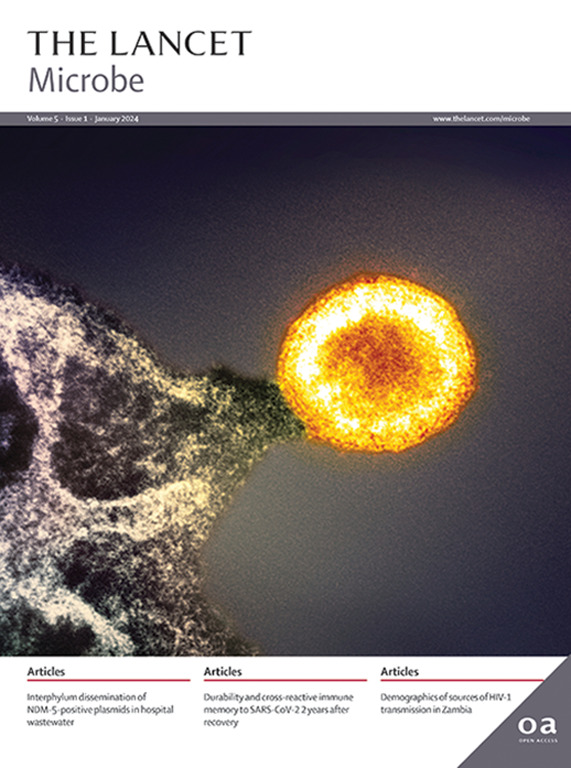Rapid pan-microbial metagenomics for pathogen detection and personalised therapy in the intensive care unit: a single-centre prospective observational study
IF 20.4
1区 生物学
Q1 INFECTIOUS DISEASES
引用次数: 0
Abstract
Background
Most clinical metagenomic studies do not provide rapid results, detect pathogens from all microbial kingdoms, or measure clinical impacts. We aimed to evaluate the feasibility, performance, and clinical impacts of a rapid pan-microbial respiratory metagenomic service for patients admitted to intensive care units (ICUs).
Methods
This was a single-centre observational study of a rapid metagenomics service that tests respiratory samples from ICU patients at Guy’s and St Thomas’ hospitals, London, UK, between Dec 5, 2023, and April 12, 2024. Testing used a previously published pan-microbial metagenomics workflow, which simultaneously detects bacteria, fungi, and DNA and RNA viruses; provides same-day preliminary results after 2 h; and provides final results after 24 h. Patients were included if they were aged 18 years or older, admitted to the ICU, had confirmed respiratory failure requiring supplemental oxygen or advanced airway support, and had at least one of the following: (1) clinical suspicion of lower respiratory tract infection based on clinical, biochemical, or radiological findings, (2) sepsis of unknown origin, and (3) concern from an intensive care physician regarding inflammatory pathology. Patients with a suspected or confirmed containment level three organism were excluded. The outcome was performance characteristics of the metagenomic test compared with routine diagnostic testing, detection of additional pathogens by metagenomics, change in antimicrobial prescribing within 24 h of testing, and initiation of immunomodulation.
Findings
We processed 114 samples (1–5 per day) from 74 patients (39 [53%] female and 35 [47%] male). 107 (94%) of 114 samples passed quality control, of which 101 (94%) provided same-day preliminary results. Bacteria were detected in 45 (43%) of 104 tested specimens, fungal organisms in 17 (16%) of 104 tested specimens, and viruses in 28 (34%) of 83 tested specimens. Sensitivity in lower respiratory tract samples after 24 h was 97% (95% CI 87–100) for bacteria, 89% (65–99) for fungi, and 89% (71–98) for viruses, with only one false positive for bacteria. Metagenomics identified 42 pathogens not detected by other tests in 32 (30%) of 107 samples. Antimicrobial therapy was changed after metagenomic results from 30 (28%) of 107 samples: 22 (21%) were de-escalated and eight (7%) were escalated. Metagenomics contributed to the initiation of immunomodulation in 15 (20%) of 74 patients for a range of inflammatory conditions. Pathogens with clinical significance to local infection control or national public health were found in ten (14%) of 74 patients, including three invasive Group A streptococci, two parvovirus B19, and one each of HIV-1, measles virus, Mycobacterium tuberculosis, Neisseria meningitidis, and Mycoplasma pneumoniae.
Interpretation
Respiratory metagenomics for ICU patients showed good performance and turnaround time, and diverse clinical and public health benefits. This ability to inform both personalised patient therapy and infectious disease surveillance needs evaluation in multicentre studies.
Funding
None.
快速泛微生物宏基因组学用于重症监护病房的病原体检测和个性化治疗:一项单中心前瞻性观察研究。
背景:大多数临床宏基因组研究不能提供快速结果,检测所有微生物领域的病原体,或测量临床影响。我们旨在评估重症监护病房(icu)患者快速泛微生物呼吸宏基因组服务的可行性、性能和临床影响。方法:这是一项快速元基因组学服务的单中心观察性研究,该研究测试了2023年12月5日至2024年4月12日期间英国伦敦盖伊医院和圣托马斯医院ICU患者的呼吸样本。测试使用先前发布的泛微生物宏基因组工作流程,可同时检测细菌、真菌、DNA和RNA病毒;2小时后提供当日初步结果;并在24小时后提供最终结果。纳入的患者年龄在18岁或以上,入住ICU,确认呼吸衰竭需要补充氧气或高级气道支持,并且至少有以下一项:(1)根据临床,生化或放射检查结果临床怀疑下呼吸道感染,(2)原因不明的败血症,(3)重症监护医生对炎症病理的关注。排除疑似或确诊感染3级微生物的患者。结果是与常规诊断检测相比,宏基因组检测的性能特征、宏基因组检测的额外病原体、检测后24小时内抗菌药物处方的变化以及免疫调节的开始。研究结果:我们处理了74例患者的114份样本(每天1-5份),其中女性39例(53%),男性35例(47%)。114个样品中有107个(94%)通过了质量控制,其中101个(94%)提供了当日初步结果。104个检测标本中有45个(43%)检出细菌,17个(16%)检出真菌,83个(34%)检出病毒。24小时后,下呼吸道样本对细菌的敏感性为97% (95% CI 87-100),对真菌的敏感性为89%(65-99),对病毒的敏感性为89%(71-98),对细菌的敏感性只有1例假阳性。宏基因组学鉴定了107个样本中32个(30%)未被其他检测检测到的42种病原体。107个样本中有30个(28%)样本的宏基因组检测结果后,改变了抗菌药物治疗:22个(21%)样本的剂量减少,8个(7%)样本的剂量增加。宏基因组学有助于74名患有一系列炎症的患者中15名(20%)开始免疫调节。74例患者中有10例(14%)检出对当地感染控制或国家公共卫生具有临床意义的病原菌,其中侵袭性A群链球菌3例,B19细小病毒2例,HIV-1、麻疹病毒、结核分枝杆菌、脑膜炎奈瑟菌和肺炎支原体各1例。结论:ICU患者的呼吸宏基因组学表现出良好的疗效和周转时间,以及多种临床和公共卫生效益。这种为个性化患者治疗和传染病监测提供信息的能力需要在多中心研究中进行评估。资金:没有。
本文章由计算机程序翻译,如有差异,请以英文原文为准。
求助全文
约1分钟内获得全文
求助全文
来源期刊

Lancet Microbe
Multiple-
CiteScore
27.20
自引率
0.80%
发文量
278
审稿时长
6 weeks
期刊介绍:
The Lancet Microbe is a gold open access journal committed to publishing content relevant to clinical microbiologists worldwide, with a focus on studies that advance clinical understanding, challenge the status quo, and advocate change in health policy.
 求助内容:
求助内容: 应助结果提醒方式:
应助结果提醒方式:


